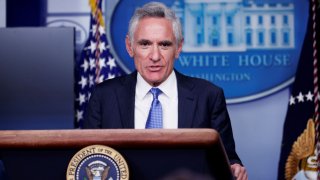
- Congressional investigators have released emails and documents that show Department of Health and Human Services appointees under former President Donald Trump regularly bragged about their efforts to influence researchers' reports on the coronavirus.
- Trump appointees succeeded on several occasions in changing language and influencing the tone of the Centers for Disease Control and Prevention's Morbidity and Mortality Weekly Reports, which offer weekly public updates on scientists' findings.
- In one example, Trump officials successfully pressured the CDC to change the opening line to a report and called it a "small victory but a victory nonetheless and yippee!!!"
Congressional investigators released emails and documents Friday that show Department of Health and Human Services appointees under former President Donald Trump regularly bragged about their efforts to alter staff scientists' reports on the coronavirus.
Officials tried to rewrite the weekly scientific reports so Trump could use the data to support his political positions on wearing masks and reopening the economy, according to the emails released Friday by the House Select Subcommittee on the Coronavirus.
"Our investigation has shown that Trump Administration officials engaged in a persistent pattern of political interference in the nation's public health response to the coronavirus pandemic, overruling and bullying scientists and making harmful decisions that allowed the virus to spread more rapidly," said subcommittee Chairman Rep. James Clyburn, D-S.C.
Get a weekly recap of the latest San Francisco Bay Area housing news. Sign up for NBC Bay Area’s Housing Deconstructed newsletter.
Clyburn accused former White House Covid-19 advisor Dr. Scott Atlas of advocating for "policies that would allow the virus to spread widely among many Americans."
Documents obtained by the panel show that Atlas was "aware of, and may have participated in, efforts to attack reports issued by the Centers for Disease Control and Prevention (CDC) in order to justify President Trump's push to reopen," Clyburn said.
Money Report
Atlas and other political appointees within HHS succeeded on several occasions in changing language and influencing the tone of the CDC's Morbidity and Mortality Weekly Reports, which offer weekly public updates on scientists' findings, the panel found. MMWRs are data-based scientific studies that aren't usually susceptible to political pressure.
The investigation was first launched after reports surfaced that Trump demanded the right to change the CDC's reports. The emails show Trump administration officials bragging about altering the reports.
"Small victory but a victory nonetheless and yippee!!!" former science advisor Paul Alexander wrote in a Sept. 9 email to let then-HHS public affairs chief Michael Caputo know he was successful in changing the opening line of a CDC report about Covid-19 transmission in school children.
Just two days later, Alexander requested Atlas' help in altering another CDC report on Covid-19 deaths among young people that Alexander said was "timed for the election" in order to keep schools closed.
"Can you help me craft an op-ed," Alexander wrote to Atlas. "Let us advise the President and get permission to preempt this please for it will run for the weekend so we need to blunt the edge as it is misleading."
Earlier in the month, Alexander had asked Atlas to draft another op-ed to oppose masks for children and school closures during the pandemic.
"I think a short 400 word op-ed on this will help people push back to school, I do think locking down our kids (and healthy adults) and masking them can dampen their functional immune systems. Do you think this can be done???" Alexander wrote in a Sept. 3 email.
Alexander famously said "we want them infected" in arguing for a herd immunity strategy in a July 4 email that was released by Clyburn's investigators in December.
In pressing for the same strategy in the fall, Atlas wrote: "Universities should stay open, even when they see an increase in cases… Yes, cases will increase among young people as they socially interact, but that shouldn't be a cause for panic," echoing dangerous herd immunity theories, in an op-ed published Sept. 15. A draft of that op-ed was first edited and revised by Alexander, according to a Sept. 8 email.
Dr. Anthony Fauci, chief medical advisor to the president, previously dismissed the idea of letting the coronavirus spread to achieve herd immunity as dangerous "nonsense" last fall.
"Dr. Fauci has no data, no science to back up what he is saying on school reopen, none … he is scaring the nation wrongfully," Alexander wrote to senior HHS officials last summer, contending that Fauci was scaring parents.
In another example, Trump officials attempted to camouflage Covid-19 case numbers with other statistics to push political talking points.
"I know the President wants us to enumerate the economic cost of not reopening. We need solid estimates to be able to say something like: 50,000 more cancer deaths! 40,000 more heart attacks! 25,000 more suicides!" Caputo wrote to Alexander in a May 16 email. "You need to take ownership of these numbers. This is singularly important to what you and I want to achieve," Caputo added in a follow-up email.
After the Trump White House appointed Nina Witkofsky as acting CDC chief of staff last summer, Alexander seemed pleased with her influence on the agency.
"The last 2 MMWR reports have been more positive than usual and I find [that] encouraging," Alexander wrote to Witkofsky in an Aug. 3 email. "Maybe you are having a huge impact and this is tremendous. Well done!"
In more emails, Alexander continuously touted his influence on the agency's reports. In another example, Alexander bragged about changes to the "key opening sentence" of a report on a Covid outbreak at a Georgia summer camp.
The line highlighted the importance of understanding youth transmission to develop guidance for school. That line was removed and replaced with another line that said there was "limited data" on coronavirus transmission in those under 21 years of age. The CDC explained that the line had been removed and replaced because of "thoughtful comments" from Alexander and CDC leaders.
Dr. Robert Redfield, then-CDC director, said last year that reports released by the agency were not affected by political interference. "At no time has the scientific integrity of the MMWR been compromised. And I can say that under my watch, it will not be compromised," Redfield testified to the Senate last September.
Redfield did, however, tell news outlets last month that Trump officials repeatedly tried to change MMWRs that they did not like, according to The Washington Post. Then-HHS Secretary Alex Azar denied that charge.
Congressional investigators are seeking more documents from appointees implicated in the emails, and others.
Alexander and Atlas did not immediately respond to requests for comment.






